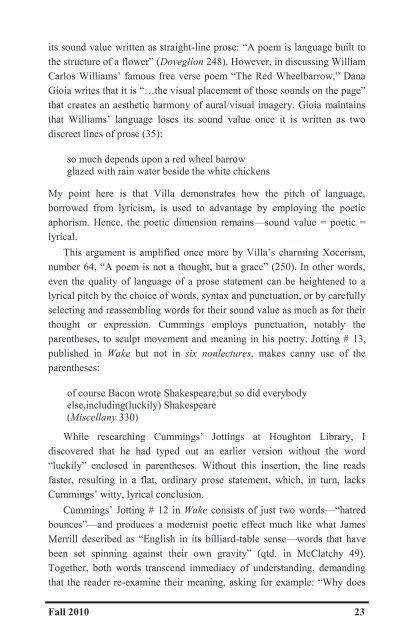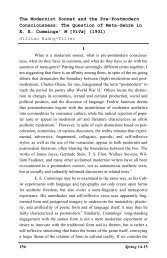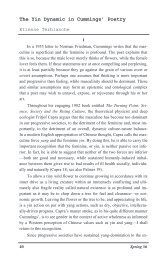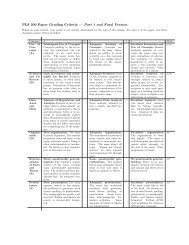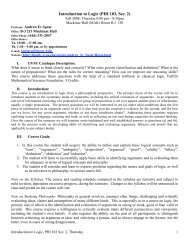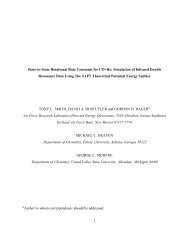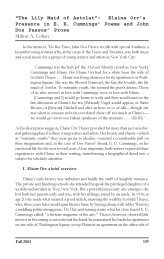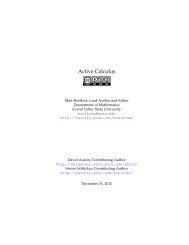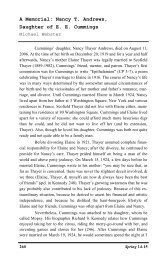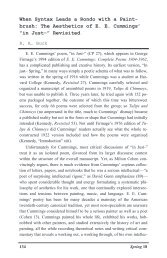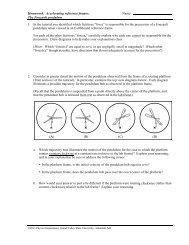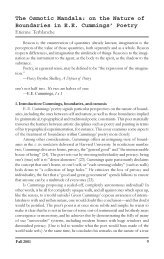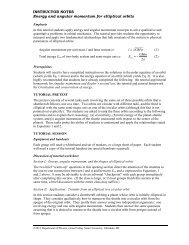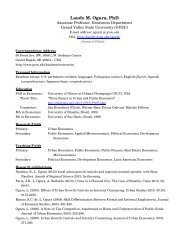E.E. Cummings' 'Jottings' and José Garcia Villa's 'Xocerisms ... - Gvsu
E.E. Cummings' 'Jottings' and José Garcia Villa's 'Xocerisms ... - Gvsu
E.E. Cummings' 'Jottings' and José Garcia Villa's 'Xocerisms ... - Gvsu
Create successful ePaper yourself
Turn your PDF publications into a flip-book with our unique Google optimized e-Paper software.
its sound value written as straight-line prose: “A poem is language built tothe structure of a flower” (Doveglion 248). However, in discussing WilliamCarlos Williams’ famous free verse poem “The Red Wheelbarrow,” DanaGioia writes that it is “…the visual placement of those sounds on the page”that creates an aesthetic harmony of aural/visual imagery. Gioia maintainsthat Williams’ language loses its sound value once it is written as twodiscreet lines of prose (35):so much depends upon a red wheel barrowglazed with rain water beside the white chickensMy point here is that Villa demonstrates how the pitch of language,borrowed from lyricism, is used to advantage by employing the poeticaphorism. Hence, the poetic dimension remains—sound value = poetic =lyrical.This argument is amplified once more by Villa’s charming Xocerism,number 64, “A poem is not a thought, but a grace” (250). In other words,even the quality of language of a prose statement can be heightened to alyrical pitch by the choice of words, syntax <strong>and</strong> punctuation, or by carefullyselecting <strong>and</strong> reassembling words for their sound value as much as for theirthought or expression. Cummings employs punctuation, notably theparentheses, to sculpt movement <strong>and</strong> meaning in his poetry. Jotting # 13,published in Wake but not in six nonlectures, makes canny use of theparentheses:of course Bacon wrote Shakespeare;but so did everybodyelse,including(luckily) Shakespeare(Miscellany 330)While researching Cummings’ Jottings at Houghton Library, Idiscovered that he had typed out an earlier version without the word“luckily” enclosed in parentheses. Without this insertion, the line readsfaster, resulting in a flat, ordinary prose statement, which, in turn, lacksCummings’ witty, lyrical conclusion.Cummings’ Jotting # 12 in Wake consists of just two words—“hatredbounces”—<strong>and</strong> produces a modernist poetic effect much like what JamesMerrill described as “English in its billiard-table sense—words that havebeen set spinning against their own gravity” (qtd. in McClatchy 49).Together, both words transcend immediacy of underst<strong>and</strong>ing, dem<strong>and</strong>ingthat the reader re-examine their meaning, asking for example: “Why doesFall 2010 23


